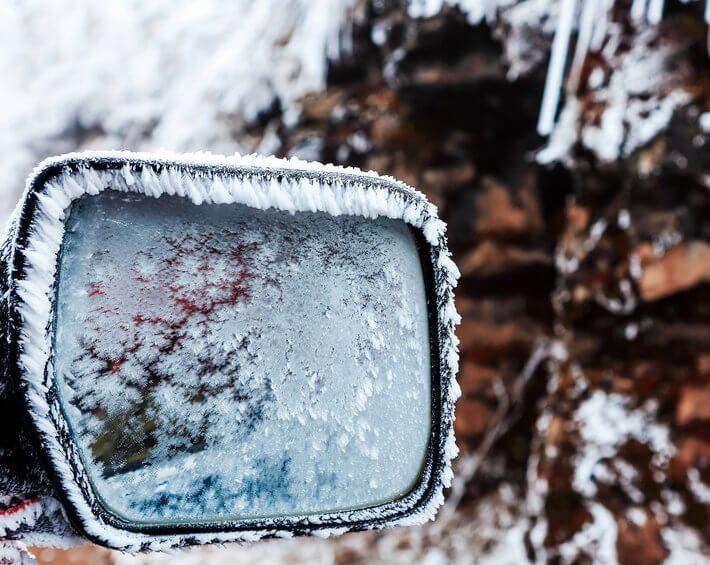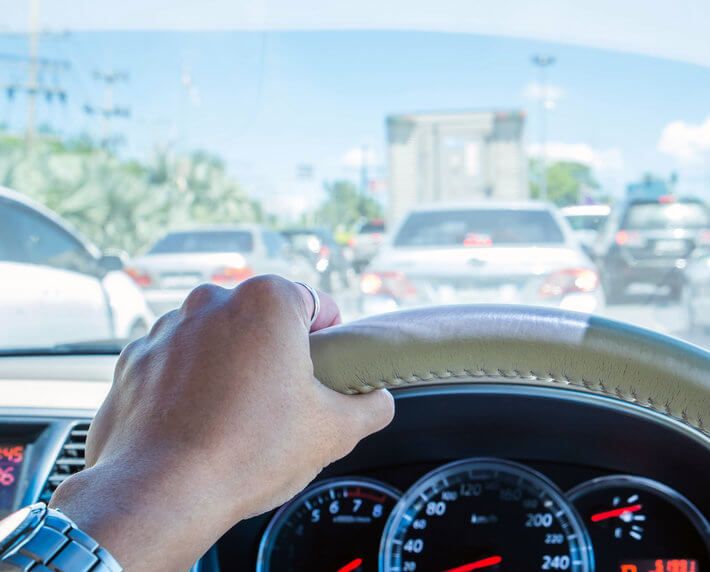The days are getting colder, the nights longer, and winter is just around the corner. Soon, millions of Americans will wake up to frosty roads, icy windshields, and stone cold engines. If you're one of the many drivers who thinks it's important to turn on your car and let it sit for a bit before hitting the road in wintry weather, you could be doing your engine more harm than good. Despite this commonly held belief, your car doesn’t need to “warm up” on cold mornings, especially if it was made after 1980. Here’s why many drivers still hold to the belief that idling is good for the engine and why this winter driving myth needs to be busted.
It's advice from the carburetor age!
Whoever told you that you need to idle your car on a cold morning to "heat things up," could be stuck in a bit of a time warp. Before 1980, most cars had carburetors, and these engines did need to warm up in the winter. Why? Carburetors regulated the air-fuel mixture within the engine and could not accurately adjust the air to fuel ratio in cold weather, reports The Washington Post. In cold temps, carburetors couldn't vaporize all the gasoline they let into the engine, so some of it would be left behind as a liquid rather than being burned off during combustion. In order to work properly, a carburetor needed to warm up or else you'd run the risk of stalling out.
Electric Fuel Injection Systems = A New Normal
Nowadays, practically every car sold in America has an electric fuel injection system that helps maintain the perfect air-fuel mixture needed for a combustion event, no matter the ambient temperature. Ergo, warming up the car before driving on a cold day has become a thing of the past. The sensors in your car's electronic fuel injection system are regulating the air-fuel mixture in real time, regardless of the temperature outside.
Manufacturers maintain that cars with modern fuel injection systems can be driven immediately on startup, no need to warm them up first. Similarly, many environmental organizations, including the EPA and DOE, recommend idling your car for no more than 30 seconds before driving on winter days. This means that your cold-day-driving-routine should look something like this: bundle up, start the car, scrape the ice off the windows and mirrors, get in the car, and get going!
Fun Fact: In the U.S., the 1990 Oldsmobile Custom Cruiser and the Buick Estate Wagon were the last new vehicles to be sold to the general public that included carburetors, reports the New World Encyclopedia.
Reasons to Avoid Idling in Winter
Still not convinced? We hear you. Changing habits can be tough. Before you commit to a long-term relationship with "warming up the car" though, check out these five reasons idling your car on a cold day could be doing your sweet ride more harm than good:
- It Causes Engine Damage: Wondering why your check engine light is on? Could be due to engine damage from idling in the winter. "Idling your car in the cold not only wastes fuel, but it's also stripping oil from critical components that help your engine run, namely cylinders and pistons," says Stephen Ciatti, a mechanical engineer who oversees the combustion engine work at Argonne National Laboratory in Illinois. Less oil means more friction, more wear and tear, and a shorter life for your engine.
- You Stay Colder, Longer: Despite the commonly held belief otherwise, your car actually heats up faster when you drive it (though this doesn't mean you should "floor it" right out of the driveway). Depending on driving conditions, it could take between 5 and 15 minutes for your engine to reach its optimum operating temperature, reports Business Insider, and you'll put undue stress on your engine if you gun it from the get-go.
- It’s Illegal. Yup. You read that right. It's illegal to leave your car running and unattended in 30 states plus the District of Columbia. Laws vary based on the circumstance and state, but they all have one goal in mind: to help prevent your car from getting stolen, regardless of the season!
- It Costs You Money, Money, Money. Even if you don’t take into account the damage you could be inflicting on your engine, idling can cost you—big time. A 2009 study in Energy Policy estimated that Americans waste $5.9 billion a year on gas while idling. Every second you spend idling is kind of like money flyin' out of your tailpipe.
- It Makes Mother Nature Sad. According to the same 2009 study, idling cars produce an amazing 1.6% of the nation’s total greenhouse gas emissions. Much of the pollution from idling cars winds up hanging around for a while, reducing air quality and contributing to ugly urban smog.
Cut idling out of your morning routine.
Idling your engine could damage your engine's pistons, decrease your car's fuel efficiency, get you slapped with a fine, and hurt the environment. Do yourself, and your wallet, a favor this season and cut idling out of your morning routine. If you're worried about engine performance this winter or perhaps your check engine light has already come on, it's time to schedule an appointment at your local Firestone Complete Auto Care location today. Our expert technicians are here to help your engine stay stronger, longer.



